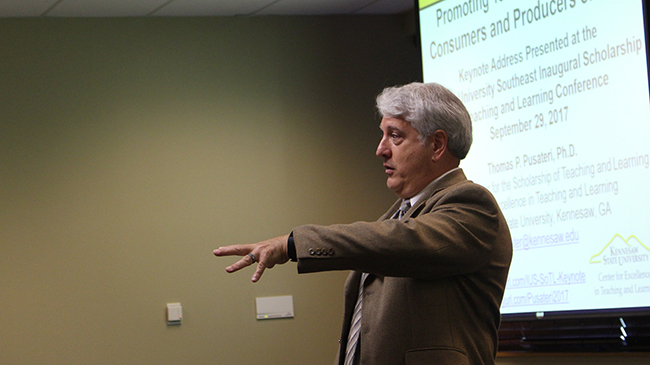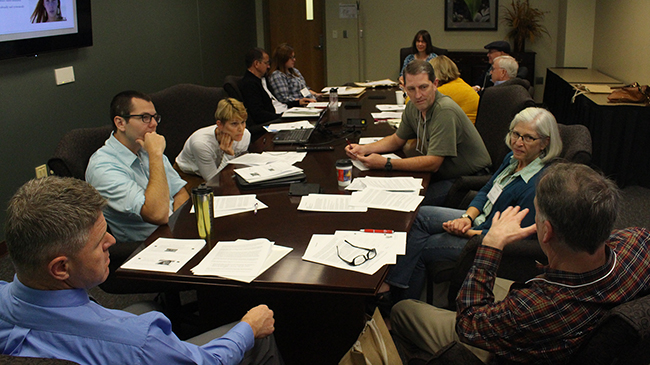By Steven Krolak
(NEW ALBANY, Ind.)—Educators from IU Southeast, Bellarmine University, Spalding University, Ivy Tech, and Jefferson Community and Technical College gathered on Friday for the inaugural Scholarship of Teaching and Learning (SoTL) conference, the first of its kind in the region.
Employing the same methods of inquiry as other fields in order to study teaching and learning, SoTL seeks to apply its conclusions to improving classroom practices and boosting student success.
The outcomes help teachers become better at teaching through deepening their understanding of subject-matter areas and helping them to master new strategies of instruction.
At the conference, concurrent sessions throughout the day addressed topics as varied as culturally responsive classrooms, Brechtian theatre, problem-based learning, the Socratic method, service learning, and much more.
Uniting all was the common desire to improve teacher performance for the benefit of students.
The art of transformation
Guest speaker was Tom Pusateri, associate director of SoTL at Kennesaw State University’s Center for Excellence in Teaching and Learning in Kennesaw, Ga. and a leader in the field.
In his keynote to open the conference, Pusateri spoke to the need for and benefits of SoTL.

Broad strokes: Keynote speaker Dr. Tom Pusateri outlines the history, intentions and benefits of the scholarship of teaching and learning.
University educators are usually teachers by virtue of their expertise in a given discipline, Pusateri observed, not necessarily because they are great teachers. Their own education has most likely focused on their subjects, not on what it takes to communicate those subjects effectively to students. With experience, advice and a bit of luck, good scholars have often become good instructors.
Beginning in the early 1990s, educators such as Ernest Boyer, chancellor of the State University of New York (SUNY) and president of the Carnegie Foundation for the Advancement of Teaching, began to rethink the basic concept of what it means to be a university educator.
Boyer and his colleagues strove to put teaching on a par with research. They sought to develop SoTL as a discrete field of inquiry, to make this process from researcher to instructor more systematic, to establish fundamental principles and best practices, to create communities for scholars to gain a deeper understanding of what teaching should be and do.
“Our whole purpose is to transform students from novices to experts in our disciplines,” Pusateri said in summary.
That takes more than info-dumping. It takes sensitivity to the ways in which students learn. And that, in turn, requires an appreciation of the cultural, demographic, emotional, social and other realities of the classroom, as well as a willingness to meet students where they are in terms of technology and mentality, among other things.
The goal is not a one-way process of knowledge transfer, but a partnership between teacher and learner. It requires, in Pusateri’s view, that teachers have the humility to see themselves as learners, to recover not only the joy of learning but also the hunger to improve that is vital to quality and longevity.

Teacher scholars from different disciplines discuss their teaching experiences in a breakout session.
Paraphrasing educational scholar Kathryn Patricia Cross, he added, “If we don’t understand how a student approaches a topic like the sciences or the arts or the humanities, then we are just teaching, and teaching without learning is just talking.”
On the practical level, teachers increasingly zero in on different forms of assessing and analyzing student work, and on requesting and internalizing student feedback. They also use this information not only to improve their own performance, but to guide research into teaching methods, sharing it publicly with colleagues who may stand to benefit. In this way, SoTL becomes a community that is steadily and dramatically developing.
And deepening.
As Dr. Susan Ambrose of Carnegie Mellon University and her colleagues write in How Learning Works, refinement of teaching inevitably leads to a questioning and hopefully strengthening of core beliefs about why one teaches.
By modeling that devotion to constant growth, instructors impact student learning as well as campus culture.
A culture of continuous improvement
IU, and IU Southeast in particular, have consistently been at the forefront of the SoTL movement.
The Journal of the Scholarship of Teaching and Learning was launched by colleagues across the IU regional campuses in 2000, and it was edited from 2011 to 2015 by Dr. Robin Morgan, professor of psychology and director of the Institute for Learning and Teaching Excellence (ILTE) at IU Southeast.
In the ILTE, IU Southeast has an office dedicated to increasing faculty awareness of SoTL research, the use of that research in designing courses and the development of SoTL research projects, according to Morgan.
ILTE drives the campus conversation around teacher development, which in turns helps to fulfill the mission, vision and strategic goals of the university.
Morgan sees the impact of SoTL in many aspect of campus culture, including the acceptance of diverse types of scholarship when considering faculty during reappointment, tenure and promotion.
“Hosting this regional SoTL conference at IU Southeast emphasizes the commitment that the ILTE has to assisting faculty in developing the tools and knowledge to continually improve their teaching, and the learning of their students,” Morgan said.
Homepage photo: Dr. Gloria Murray, professor of education and Interim director for the Office of Service Learning and Community Engagement, and Dr. Annette Wyandotte, associate professor of English and associate vice chancellor for academic affairs, await the start of the Scholarship of Teaching and Learning conference.


